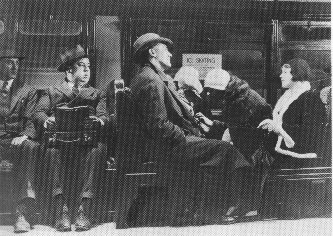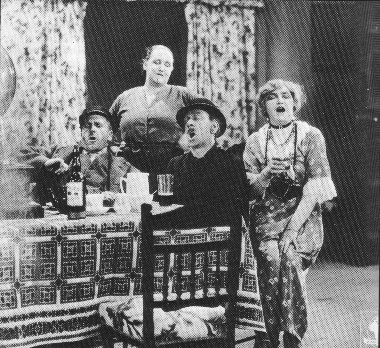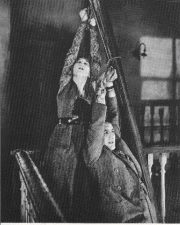|
Blackmail (1929) Screenplay:Alfred Hitchcock & Charles Bennett from his play
Photography:
Music:
Cast: Anny Ondra,
John Longden, Donald Calthrop,
Cyril Richards, Sara Allgood  
Blackmail is still interesting and in spite of the limitations of the period in special effects, they are used masterfully, especially the chase in the British Museum wich does a good use of the SChufftan Process.
Unfortunately the quality of acting is generally poor; Anny Ondra, having a heavy German-Czech accent was dubbed by English actress Joan Barry. She had been signed before it was decided to make "Blackmail" a sound movie.
The film was heralded as the first Full length, all TALKIE film made in great Britain, and Hitchcock does a good use of the new medium, especially in the scene of the breakfast the morning after the murder, when all the characters begin to talk about knives until in the head of the girl the only word she hear is "Knife"
"Well, we finished earlier tonight than I expected" even if not memorable or heroic, it is the first line spoken in a British talking picture. 
|  |
PLOT:
A girl kills the man who tries to rape her with a bread knife and her boyfriend who is a ScotlandYard Detective is in charge of the case. He quickly determines she is the killer but so does a criminal who has witnessed the fact and is now blackmailing her. The film ends with a chase in the British Museum to capture the blackmailer who can also testify she only tried to defend herself. 
Anny Ondra 
CAMEO (man with book) 
|
 |
 |
|
Juno and the Paycock (1930) Screenplay : Alfred Hitchcock, Alma Reville from the play by Sean O' Casey.
CAST: The Irish Players group. 
PLOT: This was a straightforward screen adaptation of the theatrical play. Hitchcock did not particularly liked it but the public did. The Skin Game (1931) Screenplay: Alfred Hitchcock from a play by John Galsworthy
CAST: Jill Esmond 
PLOT:
Hitchcock returned to filmed plays with this adaptation, foisted on him and for it he retained no affection, especially since he disliked the author personallyafter a dreadful dinner together. Waltzes from Vienna (1933) Screenplay: Guy Bolton from his play
CAST: Jessie Matthews,

PLOT:
The oddest example of the films the studio gave Hitchcock to direct, This rickety low-budget musical made the director feel he had reached his creative nadir. However the film is competent and at times brilliant. |
|  |
 |
 |
|
Murder (1930) Screenplay: Alfred Hitchcock,Alma Reville from a play by Clemence Dane
CAST:
Herbert Marshall,
GERMAN VERSION: Mary/Sir John greift ein! with different cast shot side by side. 
PLOT:
A young actress is accused of murdering a friend, and only thanks to the dedication of one of the jurors at her process is it revealed that the murderer is none other than the actress's fiancee.
It is the only 'Whodunnit' in Hitchcock's career and it is a fluid movie with a good interpretation by the elegant Marshall a backstage background and daring,for that time, homosexual motif. Rich and Strange (1932) Screenplay: Alfred Hitchcock,Alma Hitchcock from her original story.
CAST: 
PLOT:
The film was an uncharacteristically humorous Hitchcock, based on a script by Alma and inspired by events wich overtook the couple during a holiday which left the Hitchcocks marooned abroad. Number Seventeen (1932) Screenplay:Alfred Hitchcock
CAST: 
PLOT:
Hitchcock was assigned, and dutifully undertook, another adaptation of a stage play and delivered a competent if anonimous film. |
|

